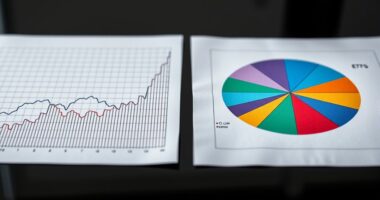Mental accounting bias affects how you make everyday spending decisions by causing you to treat different funds and categories separately, often leading to irrational choices. You might splurge from a “bonus” account or avoid spending from a “savings” pot, even if it doesn’t make sense overall. Emotions and perceptions of “house money” also influence you. Want to discover practical ways to recognize and manage these biases? Keep exploring, and you’ll find effective strategies to improve your financial habits.
Key Takeaways
- Mental accounting causes people to treat funds as separate categories, leading to irrational spending and difficulty in holistic financial management.
- Framing money as “extra” or “set aside” encourages impulsive spending on treats or luxury items.
- Emotional triggers like frustration or excitement influence spending decisions, often resulting in impulsive or restrained purchases.
- Consolidating budget categories and setting unified financial goals can reduce mental accounting biases and promote rational spending.
- Regular expense tracking and awareness of mental buckets help prevent overspending and support healthier financial behaviors.
How Mental Accounts Influence Spending Patterns

Mental accounts shape how you allocate and spend your money by categorizing funds into separate mental buckets, such as entertainment, groceries, or savings. In behavioral economics, these mental categories act as decision heuristics, simplifying complex financial choices. Instead of viewing your money as a single resource, you unconsciously assign specific budgets to each account, influencing how you spend. For example, you might splurge on entertainment because you see it as a distinct fund, even if your overall budget is tight. These mental accounts help you manage finances effortlessly but can also lead to biases, like overspending in one category while neglecting another. Recognizing how these mental buckets shape your decisions can improve your financial awareness and help you make more balanced spending choices. Additionally, understanding the role of payment processing and security measures in transactions can help prevent unintended expenses caused by fraud or errors. Being aware of how vetted financial tools and services safeguard your funds adds an extra layer of protection to your spending habits. Moreover, understanding how supermarket hours influence shopping patterns can help you plan purchases more efficiently and avoid impulsive spending, especially when considering how home theatre projectors and related entertainment investments might fit into your budgeting approach. Incorporating mindfulness practices, such as meditation, can further enhance your awareness of spending impulses and promote healthier financial habits.
The Role of Emotion in Mental Budgeting

Your emotions play a powerful role in how you allocate and spend money within your mental accounts. Emotional triggers, like frustration or joy, can influence your spending habits, often leading you to make impulsive decisions. When you feel excited or relieved, you might justify splurging on non-essentials, while feelings of guilt or regret can cause you to cut back unexpectedly. These emotional responses can distort your perception of your budget, making it harder to stick to financial goals. Recognizing how emotions impact your mental budgeting helps you become more aware of these influences. By understanding your emotional triggers, you can develop healthier spending habits and create a more balanced approach to managing your money within your mental accounts. Additionally, awareness of forsale 100 can inform your decisions by highlighting the importance of moderation and strategic spending.
Distinguishing Between “House Money” and “Guilt-Free” Funds

When managing different types of funds in your mental accounts, it’s important to distinguish between “house money” and “guilt-free” funds, as each influences your spending behavior differently. House money comes from winnings or windfalls, making it feel less costly and encouraging riskier or more indulgent purchases. Guilt-free funds, however, are allocated for leisure or treats, so you spend them without guilt. To clarify your spending, consider: 1. Recognizing when funds are house money to avoid reckless spending. 2. Setting aside guilt-free funds specifically for enjoyable expenses. 3. Avoiding mixing guilt-free funds with regular budgets to preserve their purpose. Additionally, incorporating home decor ideas, such as aesthetic hooks or stylish serveware, can help create a more inviting environment that aligns with your financial goals. Understanding this distinction helps you control impulsive buys and maintain healthier financial habits, as each type of fund impacts your decision-making uniquely, including awareness of mental accounting principles that influence how you perceive and allocate your resources. Recognizing the personality traits that drive your spending can also help you develop better financial discipline. Furthermore, understanding cultural and regional influences on spending habits can enhance your understanding of your financial behavior. Being mindful of Pimple Patch innovations in skincare, such as hydrocolloid technology, can also prevent unnecessary spending on ineffective remedies and promote more targeted, cost-effective solutions.
Common Ways Mental Accounting Skews Financial Decisions

Mental accounting often causes people to treat money differently depending on its source or purpose, leading to decisions that may not align with their overall financial goals. You might use heuristic shortcuts, like categorizing funds separately, which simplifies complex choices but can also create cognitive illusions of wealth or scarcity. For example, you may feel justified spending a bonus on entertainment while avoiding saving for future needs, because the bonus feels like “extra” money. These mental compartments distort your perception of value and risk, encouraging you to make inconsistent choices. By compartmentalizing funds, you may overlook your broader financial picture. Recognizing these common ways mental accounting influences your decisions helps you see beyond surface-level heuristics and cognitive illusions, promoting more balanced and rational financial behavior. Additionally, understanding the impact of mental accounting bias can help you develop more integrated and holistic approaches to managing your finances, especially when considering how trustworthiness of Patchology impacts product recommendations and brand reliability. For instance, awareness of these biases can improve how you evaluate spending in different categories, such as dining at Culinaria De Gustibus Bistro or enjoying unique culinary experiences. Engaging in diverse social interactions with different dog breeds can also broaden your perspective and reduce biases in decision-making. Being aware of financial decision-making heuristics can further support you in overcoming mental accounting distortions and making more informed choices.
Strategies to Overcome Mental Accounting Bias

To counter mental accounting bias, start by reframing your spending goals to focus on overall financial well-being rather than isolated categories. Next, consider consolidating your budget categories to get a clearer picture of your total finances. These strategies help you make more balanced decisions and reduce the influence of mental accounting tricks. Recognizing the wealth accumulation strategies used by top earners can also inspire more holistic financial planning. Additionally, understanding the signs of spoilage in your spending patterns can help you avoid unnecessary expenses and improve your financial health. Being aware of currency fluctuations can further enhance your ability to manage international expenses effectively, preventing small miscalculations from compounding into larger financial issues. Incorporating knowledge about electric bikes and their features can also motivate you to invest in more sustainable transportation options that align with your financial goals. Exploring alternative investments such as precious metals or real estate can diversify your portfolio and strengthen your financial resilience.
Reframe Spending Goals
Have you ever noticed how setting separate budgets for different expenses can lead to irrational spending? This is often due to psychological framing and behavioral heuristics influencing your decisions. To reframe your spending goals, try these strategies:
- View your finances holistically: Instead of separate pockets, see your money as a single resource to avoid mental accounting traps. Recognizing the importance of financial decision-making processes can help you make more rational choices. Additionally, understanding how cognitive biases influence spending can improve your ability to manage your money effectively. Being aware of mental accounting bias itself can further aid in correcting these tendencies.
- Set unified goals: Focus on overall savings or debt reduction, which helps shift your mindset from limited categories to broader objectives.
- Adjust your mindset: Recognize that money allocated for a specific purpose can be flexible if it helps achieve your larger financial aims.
- Stay informed about Nike Tech in Sneaker Culture 2024, as staying current on trends can influence your perception of value and spending priorities.
Consolidate Budget Categories
Consolidating your budget categories can effectively combat mental accounting bias by reducing the temptation to treat each expense separately. When you merge related categories, you minimize psychological segmentation that encourages viewing funds as isolated pots rather than part of a holistic financial picture. Use categorization strategies that group similar expenses—such as entertainment, dining, or shopping—into broader categories. This approach helps you see your overall spending and prioritize your financial goals more effectively, instead of focusing on small, isolated transactions. By streamlining your budget, you limit the mental shortcuts that lead to irrational spending decisions. This strategy encourages a more rational allocation of your resources and fosters a healthier, more balanced view of your finances.
Real-Life Examples of Mental Accounting in Daily Life

Mental accounting often influences how you handle money in everyday situations, even if you’re not fully aware of it. You might treat different funds as separate, leading to behaviors like:
- Using a “vacation fund” for leisure spending, even if it causes budget imbalance.
- Framing a bonus as “extra” money, making you more willing to splurge.
- Engaging in emotional spending after a tough day, viewing it as a separate “comfort” fund.
Psychological framing makes you see money differently depending on its source or purpose. This can lead to emotional spending, where you justify purchases based on mood rather than necessity. Recognizing these patterns helps you understand how mental accounting shapes your daily financial decisions, often without your realizing it.
Tips for Creating a Unified Approach to Money Management

To manage your money effectively, start by consolidating your financial accounts so you see your total resources clearly. Set specific budget goals and track all expenses regularly to stay on course. This unified approach helps you avoid mental accounting pitfalls and makes your financial decisions more consistent.
Consolidate Financial Accounts
Managing multiple financial accounts can often lead to fragmented spending and confusion about your overall financial health. To create a unified approach, consider consolidating accounts. This simplifies tracking your expenses, boosts investment diversification, and improves credit utilization. Here are some tips:
- Combine savings and checking accounts into one or two main accounts for better visibility.
- Use a single platform or app to monitor all your accounts, making it easier to spot spending patterns.
- Regularly review your accounts to ensure you’re balancing investment diversification and managing debt effectively.
Consolidation helps prevent mental accounting biases, where you might treat money differently based on its source. A unified view of your finances encourages smarter decisions and healthier money habits.
Set Clear Budget Goals
Consolidating your financial accounts sets the stage for effective budgeting by giving you a clearer picture of your overall finances. Once you see the full scope, you can set clear, specific budget goals that leverage psychological framing to motivate you. Define targets for different categories—like savings, expenses, or debt repayment—and make them measurable. Recognize emotional triggers that influence your spending, such as impulse purchases or comfort spending, and frame your goals to counteract these tendencies. Clear goals help you stay focused and reduce mental accounting bias, where you might treat money differently based on its source or category. When your goals are well-defined, you’re more likely to stay committed and make decisions aligned with your long-term financial wellbeing.
Track All Expenses Regularly
How can you guarantee your budget reflects your true spending habits? The key is tracking all expenses regularly. By doing so, you get a clear picture of your cash flow and how it aligns with your savings habits. To make this easier:
- Record every purchase, big or small, in a dedicated app or notebook.
- Review your expenses weekly to identify patterns and areas to cut back.
- Adjust your budget based on actual spending, not assumptions or estimates.
Consistent tracking helps prevent mental accounting biases from skewing your perception of money. It keeps your financial picture accurate, so you can make smarter decisions that support your savings goals and improve your overall money management. Regular expense tracking turns good intentions into real progress.
Frequently Asked Questions
How Does Mental Accounting Affect Long-Term Financial Planning?
You might find that mental accounting impacts your long-term financial planning through budget segmentation and mental categorization. When you assign funds to specific categories, like savings or entertainment, it can lead you to overlook overall financial goals. This mental segmentation can cause you to prioritize short-term needs over long-term growth, making it harder to stay disciplined and achieve a secure financial future. Recognizing this bias helps you plan more effectively.
Can Mental Accounting Lead to Overspending During Sales Events?
Thinking about sales events, you might find yourself falling into the trap of impulse buying, which can inflate your expenses. Mental accounting causes you to segment your budget, making it easier to justify splurging on sales. This segmentation tricks you into perceiving certain funds as separate, encouraging overspending. Stay vigilant, set clear limits, and resist the lure of tempting deals to keep your spending sensible and your savings secure.
What Psychological Factors Reinforce Mental Accounting Biases?
You’re often influenced by emotional triggers and cognitive heuristics that reinforce mental accounting biases. When you feel excited or anxious, these emotions lead you to categorize money differently, making it easier to justify spending. Cognitive shortcuts, like focusing on budgets or specific accounts, strengthen these biases. By recognizing these psychological factors, you can better understand why you might overspend and develop strategies to control impulsive decisions.
How Does Mental Accounting Influence Investment Decisions?
They say, “Don’t put all your eggs in one basket,” but mental accounting influences your investment choices through budget segmentation and mental categorization. You tend to treat different funds separately, making riskier decisions with some and overly conservative with others. This bias can lead to suboptimal investments, as you may ignore the overall portfolio balance. Recognizing this helps you make more integrated, rational investment decisions.
Are Certain Personality Types More Prone to Mental Accounting Biases?
Certain personality traits can make you more prone to mental accounting biases. If you’re impulsive or easily influenced by emotions, you’re likely to develop specific spending habits that reinforce mental accounting patterns. For instance, those with high impulsivity might treat windfalls differently from regular income, leading to biased decisions. Understanding your personality traits helps you recognize these tendencies and develop healthier spending habits, reducing the impact of mental accounting biases.
Conclusion
By understanding mental accounting, you can break free from financial illusions and make smarter choices. Think of your money as a flowing river, not separate ponds, so you can navigate your spending with clarity and confidence. When you recognize these biases, you gain control over your financial journey—turning scattered pennies into a well-orchestrated symphony. Take charge today, and watch your money work smarter, not harder, for your future.









